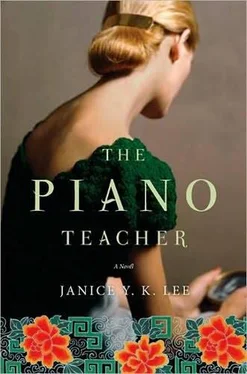“This is quite bad,” Hugh says, not caring about the travails of the young Canadian. “I hear that over at the bank, they’re burning unsigned notes so they don’t get into the wrong hands.”
“Yes,” Will says. “This is not good at all.”
“You know, two days ago, they declared a new government for Chinese civilians-they’re calling it the Civil Department of the Japanese Army and they’re trying to sort things out, get the gas, water, and electric rolling smoothly again. They want everyone to get back into the flow, open their shops, resume their jobs. All except us, of course. We’re enemy prisoners now.”
“Then why are the Chinese here?” Will looks around at all the locals. “Surely they can’t be registering everyone in the colony.”
“No, it’s a mix-up. The Japanese didn’t realize that the Chinese here regard themselves as British nationals, so a lot of them have shown up, and there’s a lot of confusion as to what to do with them. I think they only want the gweilos, to put it bluntly. I would imagine the Chinese people will go home today.”
Will notices children playing-what are they doing here? They should have been sent away months ago. Hugh follows his gaze.
“Yes, and of course, the children. Damn fools, the parents,” he says. “Sentimental. Didn’t want to send their families away to safety. Like ostriches, they were. I hope the conditions are decent.”
“Well, one hopes, yes.”
“And you heard Millicent Potter went blind from shock?”
“No, I hadn’t heard,” Will said.
“Her child died in her arms, shrapnel from a bomb, and she was holding him, and her husband said all of a sudden she couldn’t see. It comes and goes apparently, but it’s been gone for a while.”
“Awful.”
“And Trudy?” Hugh asks. “I assume she’s not involved in all this?”
“Yes, she’s Portuguese and Chinese, so both good things to be at the moment.”
“It’ll be good to have someone on the outside. She can help you get things and messages. We have our amah and houseboy tailing us at the moment. I’ve given them more money than they’ll see in a lifetime so I hope they don’t run off with it. But what could we do?” Hugh gives a wintry smile. “Ironic, isn’t it? ”
Reggie Arbogast joins them.
“The situation is bad right now. They’re winning in the Philippines and all over Malay and Burma. They’re gaining too much momentum.”
A Japanese soldier rides up on a horse.
“Line! ” he shouts. “One line. No Chinese.”
The crowd hesitates, moves in an amorphous mass, like a jellyfish, Will thinks, if he were watching from the sky. They ripple and lap, an uncertain sea creature.
“One line! No Chinese! ” shouts the soldier again, this time more loudly. He canters the horse around, waving a sword in the air. The Orientals in the mix pick themselves up and move to one side, a gradual sifting of the races.
“It’s like he’s herding us,” Hugh says to Will. “We’re the cattle.”
Will takes account of the clothes he is wearing-a sturdy pair of cotton trousers, two shirts, a sweater, and a jacket. He’s suddenly aware that they might have to last him for a long time. He’s glad he wore a heavy belt. Somehow, he thinks the strong leather and metal will come in useful.
The soldier swings around and leaves. The crowd is silent. A woman sits down on her suitcase and begins to cry. “Buck up,” her husband says. “This is just the beginning.”
They divide them into nationalities and march them in single file. Will watches the Americans walk away, along with the Dutch and the Belgians. The British are made to wait until the end. The Japanese seem to have some special prejudice against them.
They walk for hours, on almost unrecognizable roads with burning piles of rubbish outside charred buildings and the overpowering stench of rotting bodies and human waste. The mothers and children march with the men, babies crying. The roads are lined with locals, silently watching the unlikely spectacle of Western people being led away under the rule of the Oriental. Some spit in their path but most just look. Will sees relief in their faces, relief that they are not the victims, at least this time. There is also pity in some of the older faces. One brave soul in the procession tries to strike up a rendition of “Hail Britannia,” but his melody fades away under the implacable gaze of a soldier who slows his steps until he is menacingly abreast of the singer. And there is the silence again, broken only by the tramping of feet and the heavy breathing of the conquered.
They are herded into the Nam Ping Hotel, which has clearly been used as a brothel in the recent past. The lobby is dingy and smudgy-looking, with peeling red paint and garish gold Chinese characters painted onto signs.
First, they are told to take off all their watches and jewelry and place them into a large sack. Then, a Japanese soldier jerks his gun toward the stairs to indicate they should go up.
The rooms are tiny, and things get ugly, with people rushing to claim their space until they realize that no matter how quick they are, they will have to squeeze four or five into a room. The stucco walls are bubbled with moisture and decay and flakes of ceiling fall down at the slightest tremor. There are iron beds with wafer-thin mattresses and mintoi , the Chinese quilt, with large, copper-colored stains. Large cockroaches scurry around, alarmed at the sudden invasion, and the floor is wet and unpleasant. It is chaos, with people demanding toilet paper, towels, clean water, not knowing that no one is there to supply them. Some don’t seem to realize the days of amahs and chauffeurs are gone. The toilets stop up almost immediately and the hallways are filled with an unspeakable odor. Will and Hugh organize teams to clean. Some refuse, or don’t show up. Will tells the others not to worry, that there will be plenty of work to go around soon, and that everyone will do their share. The Japanese provide no guidance-some look amused at the chaos, and others are simply oblivious, putting their feet up and having Chinese children run errands for them, fetching them beer and cuttlefish.
There is no food the first night. They go to bed hungry, rooms alive with the sound of whimpering children and the labored breath of their parents. Will tucks his hands into his armpits, hears young Ned’s snore-a strange, interrupted, barking sound-and wonders what Trudy is doing.
And so he finds out. Not tooth powder but food. Food is the luxury. The Japanese hand out a watery vat of rice in the evening, with not enough chipped bowls and spoons. There is some putrid boiled meat, a few rotting vegetables swimming in brown water. The first evening, some women refuse to eat it. By the next, everyone takes their share. They find Chinese willing to go fetch food for coins tossed from the balcony, but this is an iffy proposition at best as some disappear with the money, never to be seen again. Those lucky enough to have their amahs or houseboys on their tail throw down money and get fish and vegetables tossed back in return.
There is a lieutenant in charge of the hotel, Ueki, a small man with round glasses and a mustache. He is impossible to read as Will finds out when he is elected to meet with a supervisor about the living conditions and the food. It is an odd meeting, tense and excessively polite.
Ueki has commandeered the hotel manager’s office behind the reception desk and is sitting behind a metal desk with an open bottle of whiskey and a lit cigarette smoldering in an ashtray. Smoke hangs thick in the air, unmoved by the fan that circles slowly overhead.
Will bows because it seems the right thing to do. Ueki inclines his head slightly.
“I have a few issues I’d like to bring to your attention,” Will says.
Читать дальше












